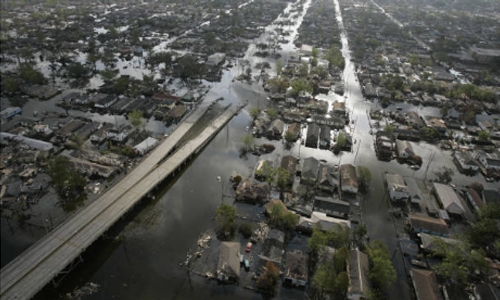Oceans turning from friend to foe, warns UN
The same oceans that nourished human evolution are poised to unleash misery on a global scale unless the carbon pollution destabilising Earth’s marine environment is brought to heel, warns a draft UN report.
Destructive changes already set in motion could see a steady decline in fish stocks, a hundred-fold or more increase in the damages caused by superstorms, and hundreds of millions of people displaced by rising seas, according to the Intergovernmental Panel on Climate Change (IPCC) “special report” on oceans and Earth’s frozen zones, known as t he cryosphere.
As the 21st century unfolds, melting glaciers will first give too much and then too little to billions who depend on them for fresh water, it finds. Without deep cuts to manmade emissions, at least 30 per cent of the northern hemisphere’s surface permafrost could melt by century’s end, unleashing billions of tonnes of carbon and accelerating global warming even more. The 900-page scientific assessment is the fourth such tome from the UN in less than a year, with others focused on a 1.5-Celsius (2.6-Farenheit) cap on global warming, the state of biodiversity, and how to manage forests and the global food system.
The final advice to policymakers will be released on September 25, too late to be considered by world leaders gathering two days earlier for a summit convened by UN Secretary-General Antonio Guterres to extract stronger national commitments in confronting the climate crisis. The Big Four -- accounting for nearly 60 percent of global fossil fuel-based emissions -- all face devastating oceanand ice-related impacts, but none seem prepared just announce more ambitious goals for purging carbon from their economies.
By 2050, many low-lying megacities and small island nations will experience “extreme sea level events” every year, even under the most optimistic emissions reduction scenarios, the report concludes. By 2100, “annual flood damages are expected to increase by two to three orders of magnitude,” or 100 to 1,000 fold, the draft summary for policymakers says. Even if the world manages to cap global warming at two degrees Celsius, the global ocean waterline will rise enough to displace more than a quarter of a billion people.
Earth’s average surface temperature has gone up 1C since the late 19th century, and is on track -- at current rates of CO2 emissions -- to warm another two or three degrees by century’s end. The Paris Agreement calls for capping global warming at “well below” 2C. “If we warm the planet by 2C, by 2100 we will only be at the beginning of a runaway train ride of sea level rise,” said Strauss, whose research informs the report’s conclusions.
Related Posts

